Dashnor Kaloçi
The first part
Memorie.al publishes an archival document issued by the Central State Archive in Tirana (fund of the former Central Committee of the ALP), which belongs to the months of July 1949, where there is a letter from the Secretary General of the Communist Party, Enver Hoxha, addressed to party organizations throughout the country, where he informs all communists about the many problems that had arisen with the party organization in the district of Lushnja. The full letter of Enver Hoxha where he explains in detail all the problems of that district where there were two parties competing between them, where the first was led by Hasan Gina, while in the second Halit Ahmeti tried to come out and related to these in the letter of enver, among others, Enver wrote: “In the organization of Lushnja there was a very pronounced and harmful party work, which if not dictated in time by the Central Committee, could degenerate into more dangerous forms for the Party. One of these parties was led by Hasan Gina and was the most dangerous party. Behind Hasan Gina there are a number of dissatisfied comrades, some unjustly hit by the hostile work of the Trotskyists, but who after the XI Plenum did not see the turn in the road and in the Party line. “With unfair methods and unclear political views, they remembered that ‘the right way’ was revenge, overestimation of their merits beyond measure and many times falsified.”
“In the organization of Lushnja there was a very pronounced and harmful side work, which if not dictated in time by the Central Committee, could degenerate into more dangerous forms for the Party. One of these parties was led by Hasan Gina and was the most dangerous party. Behind Hasan Gina there are a number of dissatisfied comrades, some unjustly hit by the hostile work of the Trotskyists, but who after the XI Plenum did not see the turn in the road and in the Party line. With unfair methods and unclear political views, they recalled that the “right path” was revenge, overestimating their merits beyond measure and often falsified. This view of matters under this prism by these comrades was dangerous and would cause them to err later on. In this group there were ambitious friends, arrivists, people with impure pasts and non-stratified origins. Among this group of sick friends, the sickest, who has acted constantly (despite the advice of the Central Committee) to worsen the situation, has been Halit Ahmeti. The second party, which did not have a figure at the top but was trying to create one (so tried to hide behind the former first secretary of the organization, who is not implicated in this group), was formed by comrades who had made mistakes before the XI Plenum, who had been struck for their mistakes, and who had been linked to each other by ill family and solidarity in the “misfortune” that befell them.
This is stated, among other things, in a letter of Enver Hoxha dated July 23, 1949, sent to all party organizations in the country, where he was informed about the major problems that had arisen in the party organization. of the district of Lushnja, where according to him there operated “two parties” that rivaled each other. The first group or party was led by Hasan Gina, while in the second group, Halit Ahmeti tried to come out. For more about this and what happened in the high party and state bodies of the Lushnja district in 1949, when official Tirana had just broken off friendly relations with the Yugoslavia of Marshal Josoif Broz Tito, this rkivor document which Memorie recognizes. al publishes it for the first time and in full in two issues of the dossier category.
Enver Hoxha’s letter on the problems that had arisen in the district of Lushnja
July 23, 1949
“ON SICK WORK IN THE ORGANIZATION OF LUSHNJA”
The Lushnja Organization is an organization with young and ideologically low cadres. A good part of the members of this organization were admitted to the Party during the years 1945-1949. Another characteristic is that the Party organization in the city dominates the village organization. The number of members of the organization is almost divided as follows: 50 percent of the members belong to the city organization and the other half are in the village. Lushnja and its district, as it is known, is an agricultural place and lacks all the industry, even if it is represented by a small factory. The craft is very little developed. Therefore, considering this fact, it was a mistake that they were initially accepted more by the city and the fair distribution of Party forces was not done leaving, as we said, 50 per cent of the communists in the city and 50 per cent in the countryside. The organization of the Party, in a relatively short period, has expanded tremendously; the proportion between candidates and members is not fair, there are more candidates than members. Admission to the Party has not been studied and on a sound basis.
The organization, especially that of the city, has expanded considerably with unhealthy elements. Elements of unhealthy attitude during the war have been introduced into the Party, of agai and kulak origin, sick intellectuals, ambitious and critical, pretentious elements who want to profit by exaggerating their war merits, in order to get out of here on the one hand personal gains and on the other hand to stifle the new and sound element of the Party, which is rising and growing in the struggle for the construction of our country. Such elements of bourgeois and micro-bourgeois origin, introduced in the organization of the city of Lushnja and especially in that of power, have become an obstacle to the normal development of the Party, to the proper implementation of the line, to the proper development of the work of the Party and of power in the village. Lushnja is an agricultural district; thus, the Party had to rely heavily on the poor and middle peasant element, which, on the basis of the victory of popular power and agrarian reform, was liberated and taken over the land. This has not been done properly and this is evidenced by the weak reach of the Party organization in the village as well as the composition of the leadership in this organization. It follows that no sound organizational work and no extensive political work has taken place.
In these directions, some of the different leaders of this organization have made mistakes and at the same time the Central Committee has not had the proper control over the development of this organization. The various main leaders of this organization, with flaws and mistakes, stemming from the micro-bourgeois waste, from the lack of a war on their part to eradicate these flaws through criticism and self-criticism, from the low ideological level of of them, from sick ambitions, have not had clear prospects, have made mistakes, which they have not known and have not corrected, have walked in the wrong path, have been shaken and influenced many times by people with interests opposite to those of the Party and have neglected the class struggle. Practically, in all these difficult situations from which the Party has passed, the bourgeoisie has not slept and has benefited from the carelessness of the leadership of the organization. The pressure of the bourgeoisie has been constant on some elements in the leadership, who have accepted this and worked under this damaging pressure. This situation could be combated if these elements did not hide their mistakes, if they were stripped of the remnants of bourgeois morality, and if they relied on the straight line of the Party and the sound element of poor and middle peasantry.
The Lushnja organization is led by these comrades with a spirit of tarafi and not by comrades with a revolutionary spirit and in the straight line of the Party. This tarafi work, which existed at the head of the organization, had also infected a number of comrades, especially in the city and government organization. Some sick comrades connected the Party affair with some persons in the leadership. This was why these sick and careerist people saw the Party as a group that could hide their flaws and mistakes, satisfy their ambitions, and allow them to maneuver by breaking the line. political and organizational aspects of the Party. The path taken by these people would lead them to enmity with the Party. The enemy of the class and the Party, by putting direct or indirect pressure on these sick elements, was quite interested in this disease in the leadership of the Lushnja organization, to deepen and thus strengthen its positions in this district, within the Party and primarily in leadership. The purpose of the bourgeoisie is reflected in these leaders of the Lushnja organization in the question: who has power in their hands. The bourgeoisie of this district, like the whole enemy bourgeoisie of the country, in an unorganized state, aims at the overthrow of the power and the transformation of the Party into a protective party of the bourgeoisie and the kulaks.
But she sees that taking power into her own hands is completely impossible, but with her people in power and in the Party to undermine these from within, it is possible, if the Party falls asleep. . The sick element in the leadership of this organization has always looked at the objective of taking the leading post in the leadership of the Party and from there to have under its control the Party and the power. The party and the government thus turned into a partisan detachment, under the leadership of some ambitious, who would surely cross the path of anti-party. So, within the organization of Lushnja for some time there was an antagonism in the leadership, a personal and party work was carried out and with anti-party actions; in this organization, where the influence of the bourgeoisie has been inevitable, two factions of comrades were formed. The comrades who do not follow the Party line, who do not see the issues through the prism and in the interest of the Party, who do not defend the Party, who do not support and empower the Party with the sound worker, peasant and honest intellectual element, patriot unblemished, they, without any doubt, fall into the positions of the bourgeoisie and accept its law. The hostile class thought that it should support one of these factions, created within the organization, and would support the side that was liberal and opportunistic towards it.
In the organization of Lushnja there was a very pronounced and harmful party work, which if not dictated in time by the Central Committee, could degenerate into more dangerous forms for the Party. One of these parties was led by Hasan Gina and was the most dangerous party. Behind Hasan Gina there are a number of dissatisfied comrades, some unjustly hit by the hostile work of the Trotskyists, but who after the XI Plenum did not see the turn in the road and in the Party line. With unfair methods and unclear political views, they recalled that the “right path” was revenge, overestimating their merits beyond measure and often falsified. This view of matters under this prism by these comrades was dangerous and would cause them to err later on. In this group there were ambitious friends, arrivists, people with impure pasts and non-stratified origins. Among this group of sick friends, the sickest, who has acted constantly (despite the advice of the Central Committee) to worsen the situation, has been Halit Ahmeti. The second party, which did not have a figure at the top but was trying to create one (so tried to hide behind the former first secretary of the organization, who is not implicated in this group), was formed by comrades who had made mistakes before the XI Plenum, who had been hit for their mistakes, and who had been linked to each other by sick familiarization and as solidarity in the “disaster” that occurred.
This was in opposition to Hasan Gina’s side, in an unjust and often unprincipled way and not on sound grounds. With these sick methods, these two pairs of parties fought among themselves: the first party, Hasan Gina, to completely eliminate these comrades and to have in their hands the leadership of the Party and the government, and the second party to protect. The first secretary of the district party for his part, though he was not implicated in this unprincipled war between these comrades, he did not know how to dictate this harmful work that existed and did not inform the Central Committee. for that matter. He, as the political secretary of this organization, did not know how to curb and cure this situation. Hasan Gina’s party intended to come to the leadership or to stay in the leadership at any cost and with wrong ways and methods and punishable by the principles of the Party, contrary to the orders and circulars of the Central Committee and with the forms and methods that smelled of bourgeois spirit. The fight of this party allegedly took place in the above forms against the first secretary of the Party for Lushnja when he was appointed together with a provisional bureau by the Central Committee until the new elections, allegedly because he had made mistakes in the past, like Hasan Gina. and the other comrades of this group were not the same as those of the first secretary not to say more serious.
Comrade Hasan Gina fell on this rotten ground and made a mistake. At the same time many sick elements have influenced him and acted to the detriment of the Party by hiding and being supported by comrade Hasan Gina. They have known to take advantage of the spirit of ambition that exists in Hasan Gina, of an unhealthy view of his capacities, of his liberalism and gentleness, and they have it. brought forward Hasan Gina. These elements, directly or indirectly, have brought to Hasan Gina the views and spirit of the bourgeoisie for action, and he has acted, sometimes consciously, sometimes unconsciously in the wrong way. One of the most harmful elements that influenced Hasan Gina was Halit Ahmeti. Comrade Hasan Gina, driven by personal ambition, by ill friendships, by unhealthy and deep judgments on the created situations and on friends, has lost his way, has forgotten the rules and the line of the Party, has forgotten the fight that the Party is waging against the kulaks and the hostile bourgeoisie of town and village. Such unhealthy work in the Lushnja organization has its source before the XI Plenum. Taking into account the social composition of the whole district of Lushnja, the hostile bourgeoisie would try to support its actions by the shaky and soft element of the Party and the government and, of course, by such elements of the city, which, in addition to flaws of the class, which exist in them, had not passed into the fierce phases of the war, and it was in these phases that they could not resist, who more and who less.
Such a thing caused a lack of vigilance and discontinuity in the consolidation of the Party and power. These proved to be liberal and influenced by various micro-bourgeois circles, easily accepting the direct or indirect influence of the upper classes, hit by war and power reforms. The class struggle, therefore, did not intensify. In dividing the land of the poor and middle peasants, mistakes were made to the detriment of these; the peasants who took the land were threatened by usurers, usurers and merchants. Some elements, which influenced the leadership of the Party and the government in the district, under the banner of the Front, spread disgust and covert and indirect threats. In such a situation, hatreds and favors existed and were supported, the intrigues of the village were encouraged and the politics in the village was done in the plan and in the positions of these small rumors and intrigues. On the other hand, the sick spirit that existed in the Party, the hostile work of the Yugoslav Trotskyists and Koçi Xoxe, was reflected and acted in this district as well, favoring such a mentality in the leadership. Unfair, ill-considered and arbitrary actions have been taken by some Party and security leaders. A wrong framework policy has been developed in this organization as well as in others. People of war are supported, then hit, favored then neglected. It depended on information, on an impression, on a personal grudge, on intrigue, by one or the other.
Such actions that arose from such an unhealthy situation, ended up in unfair decisions for the cadre. After the XI Plenum and after the I Congress the wrong actions in the line became clear, the hostile work of the Trotskyists and its consequences became clear; the Party’s line and tactics for rectifying these things also became clear. But some leaders of the Lushnja organization were far from understanding the line of the congress and the tactics to be followed and implemented. The dissatisfied elements, who were treated unfairly by the Party and security leaders, in these moments of general cleansing and healing, not recognizing their own shortcomings that existed and still exist in them and that s did the sound self-criticism of their work, in order to put the issues once and for all in the right place, why would the mistakes of others come out as well, these elements acted unjustly and not in the way of the Party . They thought it was time to take revenge against the element that had erred before the XI Plenum. This category of comrades, which includes Hasan Gina and Halit Ahmeti, came out as persecuted by the Trotskyist work, they took the flag of the war for “correction of mistakes”, which had been proven, but this flag was not in sound hands and as it was proved and more later, this group did not follow the path set by the congress, but tried to act in the spirit of tarafi, ambition, etc. which the Party condemns. It is true that some leading comrades of the Lushnja organization and the security there have made a mistake and had to make sound self-criticism before the Party mass, because this is the only way to cure them.
These comrades have received the punishment they deserved, but they must have been given the opportunity to stand up and be helped. The mistakes of these comrades as a whole were not ugly crimes. Their mistakes had to be measured to the extent of the mistakes of all that wrongdoing that had been proven before Congress and corrected according to the right orientations of Congress. This was not done in the Lushnja organization, even the opposite was done. Criticism and self-criticism have been weak from all. “People who had made mistakes were severely beaten, discredited, so much so that anyone could think that these people who have done all these illegal things should be kept in the Party.” But it went even further. From such sick and sectarian views of the cadre emerge opportunistic views of the weak element and the enemy of the class. These are like sister and brother. Elements of the hostile bourgeoisie were directly or indirectly pushed to demand the prosecution of their security comrades, why they had confiscated the couple from a bey, according to the order they had from above, or to bring to justice communist comrades, who had knocked down the gates of the beys, etc… such things. A fierce and anti-party war was waged against the communist comrades, who had made some mistakes, but who had understood these mistakes and who were working with all their might to wash away the Party.
They were fired, they were active, but the view of these comrades, who were being rehabilitated, remained the same and as a result, these comrades continued to be discredited. The side of Hasan Gina, of Halit Ahmeti with friends, wanting to burn, putting the new friends, who had made mistakes, in a completely unjust and not at all healthy way; broke the rules of the Party, did not preserve the conspiracy. Everything that took place in the grassroots organizations sparked public debate and conferences. Suspicious people and enemies were being held by the mouths of communist comrades for what was being said and decided about them in cells and in committees. The reaction was creating opinions to raise one side to the sky and bury the other side. Hasan Gina’s party has tended and acted, breaking every organizational rule, to bring the comrades of various organizations to be judged, to be criticized in the basic organization of the city government, where they had the support and that this organization appeared and is presented more ill, because it was generally composed of unhealthy elements and full of flaws. The party of Hasan Gina and Halit Ahmeti with friends throughout this period have adopted an opportunistic attitude towards the bourgeoisie of the city and the village. This was offered to the friends of this group and was not badly received by them. These comrades have listened carefully to the complaints of these “scoundrels persecuted by the communists”, they have given you many times the right, they have given you hope and to attack the people of the Party. / Memorie.al
Continues in the next issue




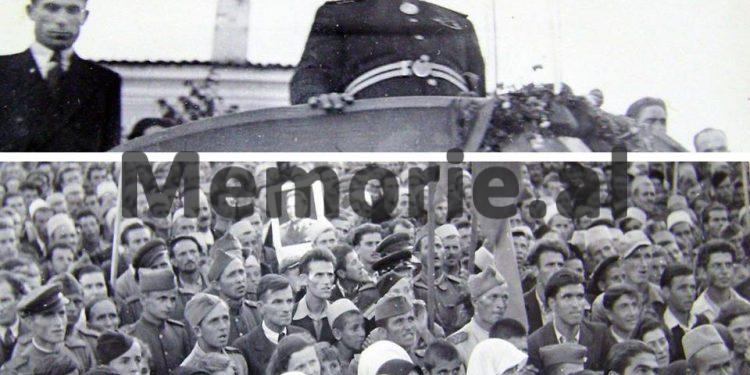
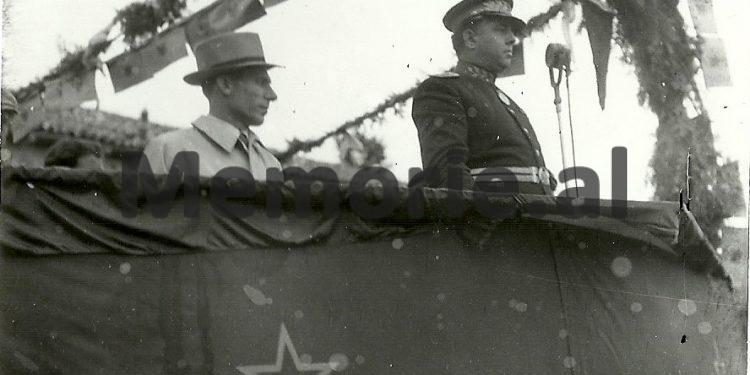
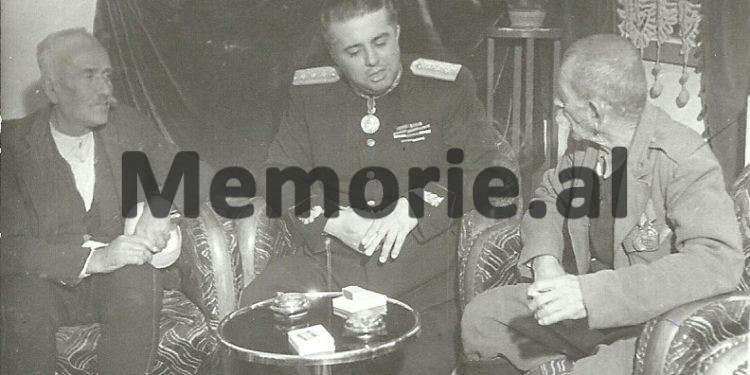
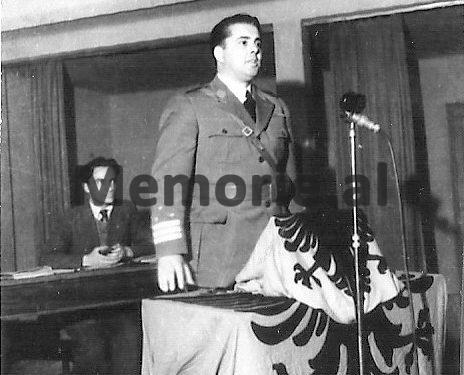
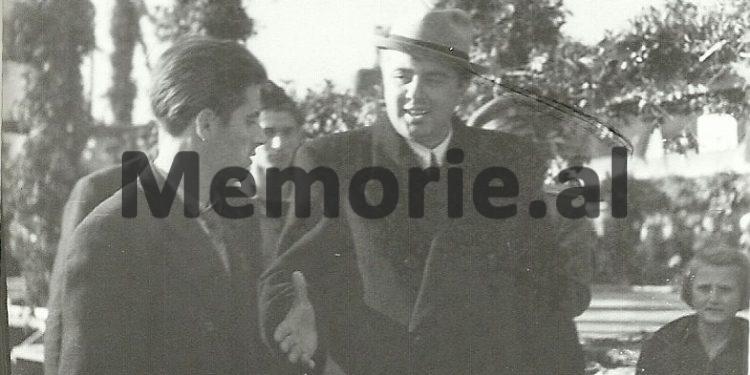
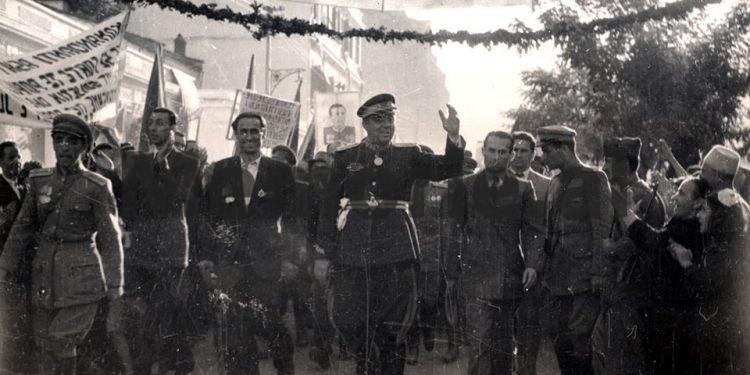
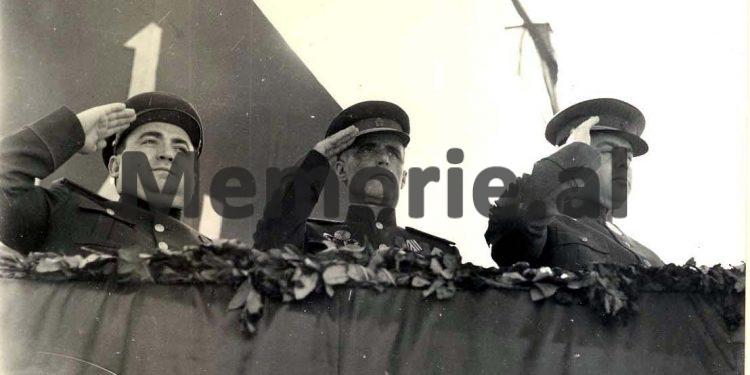
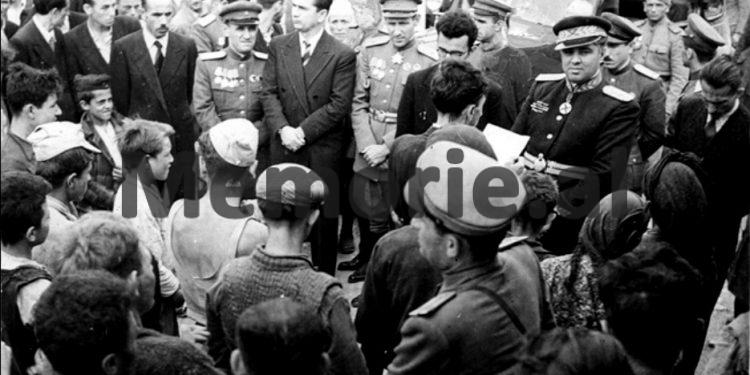


![“The ensemble, led by saxophonist M. Murthi, violinist M. Tare, [with] S. Reka on accordion and piano, [and] saxophonist S. Selmani, were…”/ The unknown history of the “Dajti” orchestra during the communist regime.](https://memorie.al/wp-content/uploads/2026/02/admin-ajax-3-350x250.jpg)
![“In an attempt to rescue one another, 10 workers were poisoned, but besides the brigadier, [another] 6 also died…”/ The secret document of June 11, 1979, is revealed, regarding the deaths of 6 employees at the Metallurgy Plant.](https://memorie.al/wp-content/uploads/2026/02/maxresdefault-350x250.jpg)


